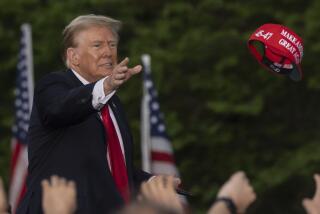G-20 summit ends with watered-down agreement
The leaders of the world’s 20 major economies on Friday ended a frequently rancorous two-day summit in this northeast Asian capital without reaching agreement on specific steps to avert damaging currency and trade wars.
There were far more setbacks than gains, but President Obama suffered the biggest disappointment, falling short in his attempt to forge a unified approach to boosting the global economy.
In one blow, G-20 members refused to endorse a U.S. effort to force China to raise the value of its currency, prolonging a bitter dispute that many say could eventually lead to a global trade war. Before world leaders left the city, they issued a watered-down statement agreeing merely to refrain from “competitive devaluation” of currencies.
The joint statement described their intent to promote growth while balancing trade and exchange rates and avoiding protectionist policies in general. U.S. officials described it as a substantial deal that will help relieve some of the pressure on countries suffering big trade deficits. But nations are under no binding obligation to follow the agreements.
The previous day, the U.S. and South Korea acknowledged that they remained in a stalemate over a free-trade agreement that has languished in the national legislatures of both nations.
In his final speech, Obama put a positive spin on a disappointing summit, saying that the world’s developed and developing economies have been successful in putting the global economy back on a path toward recovery.
Yet he acknowledged that the summit nations risk slipping back into the old imbalances that contributed to the global economic crisis.
Still, he would not admit defeat in back-door meetings that often seemed on the verge of breaking into hostility.
“The work that we do here is not going to seem dramatic. It is not always going to be world-changing. But step to step, what we’re doing is building stronger international mechanisms and institutions” and reducing tensions among nations, Obama said.
He also blamed the media, saying that the reporting on the G-20 summit has been “all about conflict,” while ignoring that what was accomplished.
He stressed that G-20 leaders made strides, including the development of a system to give the international community a mechanism to determine whether countries are engaging in unfair practices with their trading partners.
“Sometimes I think naturally there’s an instinct to focus on the disagreements,” the president said, when in fact “in each of these successive summits we’ve actually made progress.”
But time and again in Seoul, world leaders showed that they were in no mood to compromise and instead were headed toward broad, general pledges that did little to mask their inability to find common ground for immediate action.
At times, that failure to find consensus raised the specter of countries pursuing their own interests at the expense of coordinated and balanced global growth.
British Prime Minister David Cameron warned of the risks of that route at the summit opening, saying failure by the G-20 to accomplish some sort of global accommodation could lead to “a return to what happened in the 1930s: protectionism, trade barriers, currency wars, countries pursuing beggar-thy-neighbor policies; trying to do well for themselves but not caring about the rest of the world.”
Many countries, however, appeared to be doing just that. In particular, they took aim at the Federal Reserve’s recent decision to pump $600 billion into the U.S. financial system, a move that critics saw as an attempt to lower the value of the dollar and therefore make U.S. exports more competitive.
As the leaders gathered in Seoul, Bank of China Chairman Xiao Gang called the Fed’s move “dangerous,” writing in the semiofficial China Daily newspaper that it had driven the dollar down in value, raised expectations of inflation and hurt other economies. That position was backed by former Federal Reserve Chairman Alan Greenspan, who said the U.S. was “pursuing a policy of currency weakening.”
U.S. officials declared they were doing no such thing. And, in fact, the U.S. dollar has been rising in value in recent days.
“We will never seek to weaken our currency as a tool to gain competitive advantage or to grow the economy,” Treasury Secretary Timothy F. Geithner told CNBC from Seoul. “It’s not an effective strategy for any country, and it’s not for the U.S. We’ll never do that.”
But sharp opposition to the move from China and Germany, among others, also scuttled Obama’s original goal of getting countries with large trade surpluses to agree to reduce those imbalances to measurably lower levels.
Instead, G-20 negotiators have agreed to delay creation of “indicative guidelines” — which would assess economic imbalances — until finance ministers and central bankers meet again in 2011, a G-20 source told Reuters news agency. Negotiators also said they would seek the aid of the International Monetary Fund to find ways to measure those imbalances.
The concessions Obama sought on trade, while potentially beneficial to developed and developing countries in the long run, could rein in growth for nations that have rebounded from the recession faster than the U.S. — notably China, Germany and South Korea.
The limits of Obama’s bargaining power, eroded by the frail domestic economy and recent devastating Democratic losses at the polls, were reflected in the president’s failure to wrap up a new free-trade agreement with South Korea on Thursday. Continuing disputes over beef, auto imports and other issues forced him to abandon a self-imposed deadline of wrapping up the long-stalled deal before the summit.
Obama held separate meetings Thursday with the heads of China and Germany — two export powerhouses opposed to his agenda.
In particular, Obama sought to persuade Chinese President Hu Jintao to speed up the rise of the yuan’s value against the dollar, which could help the United States on exports and jobs.
Hu told Obama that China was committed to having a more flexible exchange-rate system, officials said. But the 80 minutes of talks produced no new signs of progress.
Germany’s leader, Chancellor Angela Merkel, who met separately with Obama, also refused to give any ground in her opposition to an earlier American proposal to set concrete limits on trade imbalances.
In Seoul, Obama is visiting his third nation in less than a week, part of a four-country swing through Asia aimed at strengthening American relations and presence in this fast-growing region, in both economic and national security terms.
The president began the day Thursday visiting U.S. troops stationed here, and he later took up the issue of North Korea, saying the rogue regime must demonstrate its sincerity about giving up its nuclear weapons program if new diplomatic talks are to begin.
“We have to see a seriousness of purpose by the North Koreans in order to spend the extraordinary time and energy that’s involved in these talks,” Obama said at a news conference with South Korean President Lee Myung-bak.
Their joint conference at South Korea’s presidential Blue House took on a somber tone after the two leaders announced there was no free-trade deal yet. The agreement has languished for more than three years as Democratic lawmakers have sought stronger market openings for American auto and beef producers. Even after furious round-the-clock negotiations, the two sides remained divided.
The failure to secure a deal at the summit, when the world was focused on Seoul, was a bitter disappointment for Lee, who has staked his political fortunes by making a free-trade pact with the U.S. a priority.
“This failure may have doomed the FTA altogether for good,” said Jae H. Ku, director of the U.S.-Korea Institute at the Johns Hopkins School of Advanced International Studies.
Politically, that is unlikely to cost Obama nearly as much as it does Lee. With labor and many Americans deeply suspicious about the benefits of global trade, Obama has been careful to tailor his message during this 10-day Asia tour as a mission to create American jobs, not an all-out embrace of free trade.
Over the decades, the U.S. economy, namely its consumers, has driven global economic growth and enriched export-focused centers such as Japan, South Korea and Taiwan.
But after a devastating recession that exposed the indebtedness of American consumers and left the nation with unstable economic growth, American consumers have pulled back.
Obama has repeatedly said that means other countries need to step up and expand their domestic spending to offset the reduced demand in the U.S.
By the International Monetary Fund’s measures, among G-20 members Germany is running the largest trade surplus as a percentage of its overall economy.
Germany’s economy is built around exports, and its schools, financing and government policies support the country’s focus on manufacturing. Much of the same can be said for China, Japan, South Korea and other export-driven economies.
Times staff writer Jim Puzzanghera in Washington contributed to this report.
More to Read
Start your day right
Sign up for Essential California for news, features and recommendations from the L.A. Times and beyond in your inbox six days a week.
You may occasionally receive promotional content from the Los Angeles Times.









